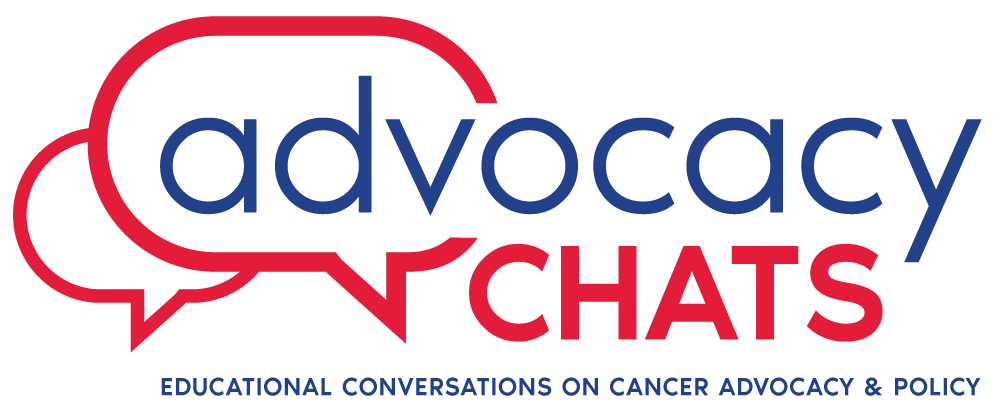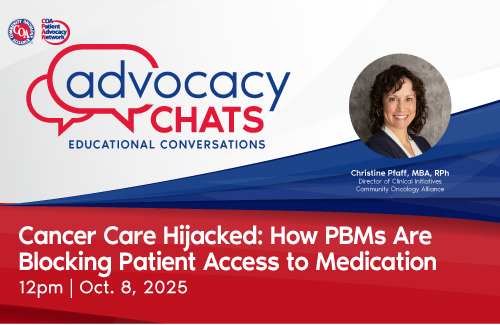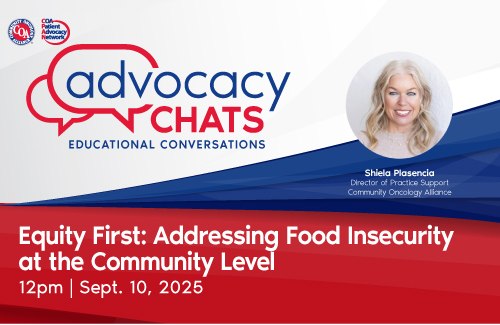Policy and Prevention from the Personal Angle
Policy and Prevention from the Personal Angle
The Community Oncology Alliance (COA) and the Prevent Cancer Foundation (PCF) represent different constituencies. Yet, the organizations have similar goals on various topics like early detection, prevention efforts, health equity, and empowering members to be cancer care advocates. COA’s Director of Patient Advocacy and Education, Rose Gerber, MS, was joined by PCF’s Senior Director of Policy and Advocacy, Caitlin Kubler, to discuss how personal experiences fuel the causes of cancer, prevention, and common-sense cancer policy. Rose and Caitlin talked about their journeys to becoming advocates after personal experiences with cancer and how those experiences affect how they approach policy and lead others to become advocates.
About the Prevent Cancer Foundation
Founded in 1985, PCF has been a pioneer in cancer prevention and early detection, giving people the best possible chance of living long, healthy lives. The foundation works to create a world where cancer is preventable, detectable, and survivable for all. PCF is the only U.S. based nonprofit organization solely focused on prevention and early detection. Their mission is to empower people to stay ahead of cancer.
Caitlin’s Cancer Journey
Caitlin was fascinated by science and medicine from a young age. She volunteered at the local hospital while in high school and became an emergency medical technician (EMT) right out of high school. She volunteered with the local fire department while getting her degree in health sciences management at George Mason University. She was not focused on cancer until years after she learned her mother had had stage 3 colorectal cancer while she was in middle school.
She was home for a weekend, during dinner with her family, when her mother nonchalantly blurted, “Back when I had cancer . . .” taking her and her sisters entirely by surprise. This brought on a series of rapid-fire questions. Her mother revealed that her gynecologist had suggested she have a colorectal cancer screening test.
The results were positive and confirmed by additional testing to reveal that the cancer had perforated the wall of her colon and spread to her lymph nodes. The prescribed treatment was the removal of a third of her colon, her appendix, and 13 lymph nodes, followed by almost a year of chemotherapy. She did all this while working full-time. After five years, she had no signs of cancer, and today is 75 years old and healthy. Grateful for her mother’s outcome, Caitlin still struggles when she thinks about how her mother went through her entire cancer journey – mostly alone – and never shared her situation with anyone other than her husband, Caitlin’s father.
Rose’s Cancer Journey
When Rose was diagnosed, her son and daughter were eight and six years old. Like Caitlin’s mother, but for different reasons, to protect her young children, Rose chose to be very private about her cancer. She told no one beyond her children and immediate family to avoid discussing her prognosis and the issues that might arise.
The PCF Mission
Considered by others to be a “patient” advocacy group, PCF considers itself a “people” advocacy group because its audience is the general public. They carry out their mission by focusing on four areas:
- Research
- Acts as a source of seed funding so researchers may qualify for more extensive research grants
- Advances policy to ensure access to funding
- Provides education and resources to the public
- Education
- Empowers people with information and tools about cancer prevention and early detection which results in better outcomes
- Outreach
- Research and surveys regarding screening timetables and compliance
- Advocacy
- Influences public policy
- Raises awareness
- Connects and coalesces with other national cancer organizations
PCF’s priorities are to increase funding for federal cancer research and prevention programs, reduce health disparities, and support legislation that improves access to prevention and early detection.
Advocacy Matters
Ultimately, advocacy is about using one’s voice to drive change. Advocacy influences public policy, funding, and laws to ensure people have access to prevention and early detection. It is not just about raising awareness but about turning awareness into action that leads to measurable improvements.
We know that of the five types of cancer screenings that Medicare covers (breast, cervical, colorectal, lung, and prostate), all but lung cancer screenings came through legislative action. We know that advocacy is how we move from research to reality, and scientific breakthroughs do not matter if people cannot access them. Without advocacy, critical cancer prevention programs would not exist.
Advocacy in Action
Cancer Prevention and Early Detection Month
In 2024, PCF contacted its advocacy network partners to help have April declared Cancer Prevention and Early Detection Month through a national proclamation. Over 80 groups joined PCF to request this proclamation. Throughout the month, resources were shared, a satellite media tour was held, a reception on the Hill honored advocates, and all partners were enlisted to spread the word about cancer prevention and early detection.
Medicare Multi-Cancer Early Detection Screening Coverage Act
The foundation supported this bill (S. 2085 and H.R. 2407) with over 500 signatures from across the United States representing patients, providers, rural health, and others. Enabling access to these blood tests, which can detect over 50 different types of cancers, will incrementally make prevention and early detection more prevalent.
Becoming a CPAN Advocate
The COA Patient Advocacy Network (CPAN) is another advocacy option where you can learn more about policy issues, join advocacy events, and make your voice heard. There are several ways to make this happen:
- Participate in the monthly CPAN Advocacy Chats: Educational Conversations on Cancer Advocacy & Policy
- Sign up to receive the CPAN newsletter
- Visit the CPAN website to learn how to take action
- Share your story
- Follow CPAN on social media
CPAN Advocacy Chats are regular virtual 30-minute educational conversations about cancer advocacy and policy with a guest speaker invited to discuss issues important to patients and advocates. Summaries of previous Advocacy Chats are available on the CPAN website.
Past Advocacy Chats





